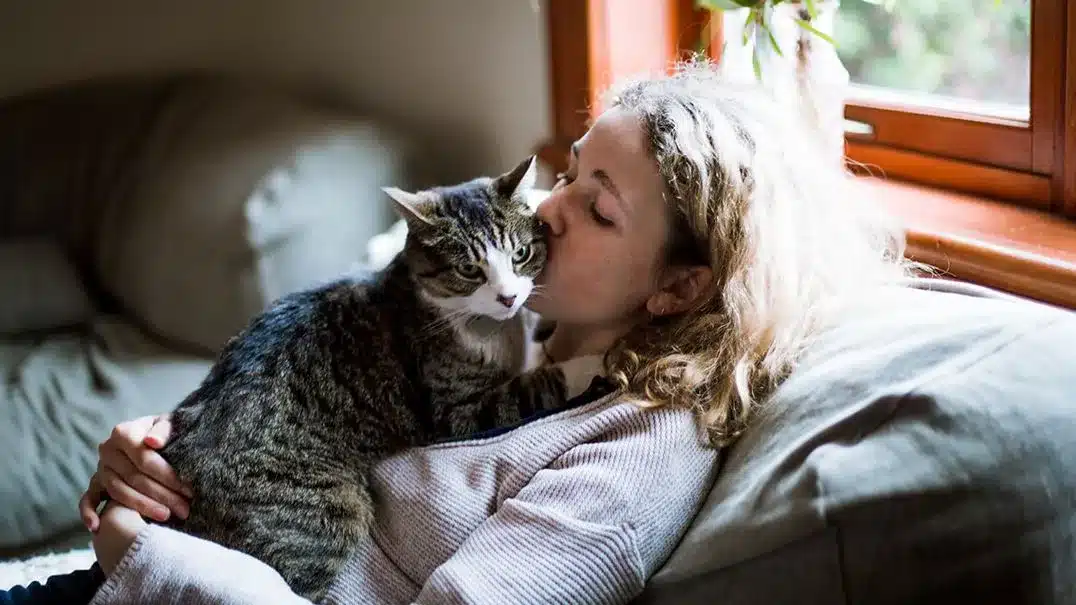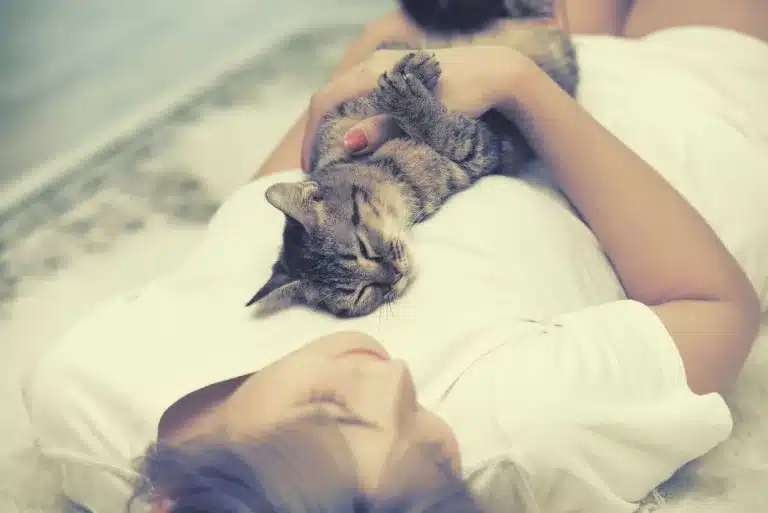Why Is My Cat So Affectionate at Night? – 10 Possible Reasons & Solutions
Have you ever wondered “Why Is My Cat So Affectionate at Night?” While cats are known for their independent and sometimes aloof nature, many cat owners observe a noticeable shift in behavior as the day turns to night.
This sudden affectionate behavior can be both endearing and puzzling. It’s not just a quirk of your pet; there’s a range of reasons why your cat may exhibit this nocturnal change in demeanor.
Cats are complex creatures with behaviors that are deeply rooted in their instincts and environmental interactions. Understanding why your cat becomes more affectionate at night can help you strengthen the bond with your pet, ensuring both of you enjoy peaceful and happy evenings together.
Cats may become more affectionate at night due to their natural instincts, environmental changes, seeking comfort and warmth, health issues, or simply because they crave your attention after a quiet day.
Why Is My Cat So Affectionate at Night?
1. Natural Instincts and Nocturnal Behavior
Cats are naturally more active during the early and late hours of the day, a trait inherited from their ancestors. This crepuscular activity pattern means they are wired to hunt and explore during dusk and dawn, which often extends into nighttime playfulness and social interactions.
At night, when the house is quiet and less hectic, your cat may seek you out for companionship and play, displaying affection as part of their active nighttime behavior.
- Encourage nighttime play: Offer toys and activities that satisfy their hunting instincts during these active periods.
- Interactive play sessions: Spend time playing with your cat in the evening to help them expend energy.
2. Seeking Comfort and Warmth
As the temperature drops at night, cats often seek warmth and comfort. Your bed, with its soft blankets and your body heat, presents the perfect spot for them to snuggle up and stay warm.
This desire for coziness can lead to more affectionate behavior as they try to maintain a comfortable body temperature.
- Provide warm sleeping spots: Ensure your cat has access to cozy, warm areas in the house.
- Use thermal beds or blankets: Offer specially designed pet beds that retain heat to keep them warm at night.
3. Trust and Security
Nighttime affection can also be a sign of trust and security. Cats feel vulnerable when they sleep, so choosing to cuddle with you is a significant sign of their trust and comfort in your presence. This behavior strengthens the bond between you and your cat, showing their reliance on you for safety and security.
- Create a safe environment: Make your home a comfortable and stress-free space for your cat.
- Bonding time: Spend quality time with your cat to build trust and a sense of security.
4. Routine and Expectation
If you have a consistent routine of winding down or going to bed at a certain time, your cat may have come to expect and look forward to this quiet time with you. They adapt to the household schedule and often become affectionate at night as part of this routine, seeking your attention and company.
- Maintain a consistent routine: Stick to a regular schedule for feeding, play, and bedtime.
- Evening bonding: Dedicate time each night for cuddling or quiet interaction with your cat.
5. Hunger and Feeding Cues
Cats are smart and may link your bedtime or nighttime routine with feeding times or treats. If they have learned that being affectionate earns them a midnight snack or early breakfast, they might display more affectionate behavior to prompt you to feed them.
- Regular feeding schedule: Keep your cat on a consistent feeding schedule that doesn’t encourage late-night eating.
- Avoid night-time feeding: Discourage associating affection with getting food at night by not feeding them during these hours.
6. Health Concerns
A sudden increase in affectionate behavior can sometimes be a sign of underlying health issues. Cats may seek comfort from their owners when feeling unwell or in pain.
It’s essential to monitor any additional symptoms like changes in appetite, litter box habits, or vocalizations and consult with a veterinarian if you notice unusual behavior.
- Regular health check-ups: Ensure your cat has annual veterinary visits and check-ups to catch any health issues early.
- Monitor behavior changes: Keep an eye on any sudden or drastic changes in behavior that could indicate health problems.
7. Anxiety or Stress Relief
Cats may become more affectionate at night as a way to seek comfort and relieve stress or anxiety. The quiet and calm of the evening can make them feel more secure, leading them to seek out your presence for reassurance and comfort.
- Stress reduction: Identify and eliminate stressors in your cat’s environment.
- Comforting presence: Be available and comforting, providing a stable presence to help alleviate their anxiety.
8. Seeking Attention
After a day of solitude or minimal interaction, cats may crave your attention at night. They take advantage of the quiet time to remind you of their need for social interaction, play, and affection.
- Daily interaction: Make sure to spend quality time with your cat during the day.
- Attention and play: Engage in interactive play and provide affection to fulfill their social needs.
9. Environmental Changes
Changes in the household or environment, such as new pets, family members, or even rearranging furniture, can impact your cat’s behavior. They may become more affectionate at night as they adjust to these changes and seek comfort and familiarity in you.
- Gradual introduction to changes: Introduce new pets, people, or changes in the home slowly and carefully.
- Consistent environment: Maintain a stable environment to minimize stress for your cat.
10. Age-Related Behavioral Changes
As cats age, their behavior and needs can change. Older cats may seek more affection and closeness during the night as a way to find comfort and assurance. Age-related health issues like arthritis or cognitive decline can also lead to increased nighttime affection as they look for comfort in response to pain or confusion.
- Accommodate aging needs: Modify their living space to accommodate any age-related limitations.
- Regular veterinary care: Monitor their health closely and maintain regular veterinary visits to manage any age-related conditions.
Frequently Asked Questions (F.A.Q)
Why is my cat only affectionate to me?
Your cat may be particularly affectionate toward you because you represent safety, comfort, and familiarity. This behavior is often a sign of trust and a strong bond, developed through spending quality time together and consistently meeting your cat’s needs.
Could sudden nighttime affection be a sign of illness?
While it’s less common, increased affection can sometimes indicate an underlying health issue. Cats may seek comfort from their owners when they’re not feeling well. It’s important to monitor for other signs of illness and consult with a vet if you notice changes in their behavior or health.
How should I respond to my cat’s sudden affection at night?
Responding positively to your cat’s affection is key. Ensure they have a comfortable environment, maintain a consistent routine, and provide them with attention and playtime. This will help satisfy their needs for interaction and comfort, especially during the night.
Wrapping Up
Understanding your cat’s sudden affectionate behavior at night involves considering various factors, including their natural instincts, health, environmental changes, and the bond they share with you. While this behavior is often a sign of trust and comfort, it’s important to stay attuned to your cat’s overall well-being and consult a professional if you suspect any health issues.


